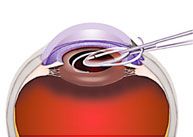Side Effects and Complications - RLE
The purpose of refractive surgery is to reduce the dependence on corrective lenses. Alternatives to surgery are wearing glasses or contact lenses. However, the result or success of an operation can never be guaranteed.
Minor problems, such as different light perception, increased sensitivity to light and glare, dryness or foreign body sensation as well as disturbances of the eyelid movements can occasionally occur.
Since the eye is minimally opened during the course of the operation, germs could penetrate and cause an infection. If left untreated, this can lead to severe permanent damage or even loss of vision. However, such infections are extremely rare under the strict sterile surgical conditions. The risk of intraocular bleeding or swelling is extremely low.
The suction and irrigation processes during the operation sometimes lead to movements in the eye. This can lead to tears or holes in the retina or the suspension apparatus of the lens. However, ophthalmological checks and treatments usually prevent retinal detachment. Most changes can be treated with laser.
If the wound does not heal perfectly symmetrically for certain reasons, symptoms such as corneal curvature are possible. The image distortions can, however, usually be compensated by spectacle lenses or a post-correction.
This list of possible risks and complications of surgical procedures is intended to make you aware that all medical procedures involve principle and special dangers. These can leave behind temporary or permanent damage and can never be excluded with absolute certainty, even if extreme care is taken. Only unforeseeable and particularly atypical risks are not mentioned.
Risks and possible side effects during the healing process:

|
|
|
- Infections of the eye with the possibility of severe impairment up to loss of vision of the eye. |
|
- Increased sensitivity to light and glare, possibly in the long term. |
|
- Decreased night vision, possibly permanent. |
|
- Overcorrection or undercorrection with the need for further surgery or corrective glasses. |
|
- Change in spatial vision, which can lead to a disturbance in orientation, e.g. when driving a car. |
|
- If you are over 40 years old, you may need reading glasses after the surgery. |
|
For our female patients: Please note that the administration of antibiotics on the day of surgery can influence the effect of contraceptives for about 1 week. |
These risks can be extremely rare, isolated or regular. This frequency information does not correspond to the information given in the package leaflets for medicines. They are only a general assessment and are only intended to serve as a weighting. The risk assessment for each patient is carried out individually in the consultation itself.
Laser Clinic
LOHR
Partensteiner Str. 6
97816 Lohr am Main
0 93 52/ 60 214 20
WÜRZBURG
Domstr. 1
97070 Würzburg
09 31/ 32 930 930
Ophthalmic practices
LOHR
Partensteiner Str. 6
97816 Lohr am Main
0 93 52/ 60 214 10
WÜRZBURG
Domstr. 1
97070 Würzburg
09 31/ 32 930 939
MARKTHEIDENFELD
Luitpoldstr. 31
97828 Marktheidenfeld
0 93 52/ 60 214 10
KARLSTADT
Gemündener Str. 15-17
97753 Karlstadt
0 93 52/ 60 214 10
HAMMELBURG
Berliner Str. 21a
97762 Hammelburg
0 97 32 - 43 31
Surgical centers
LOHR
Partensteiner Str. 6
97816 Lohr am Main
0 93 52/ 60 214 12
WÜRZBURG
Domstr. 1
97070 Würzburg
09 31/ 32 930 939
MILTENBERG
Regional partial professional association
Hauptstr. 21
63897 Miltenberg
0 93 52 / 60 214 12
BUCHEN
Regional partial professional association
Dr.-Konrad-Adenauer-Str. 37
74722 Buchen
0 93 52/ 60 214 12
FURTHER LINKS:
www.augen-lohr.de
www.augenlaserzentrum-lohr.de
Quick contact
E-MAIL
info@augen-lohr.de
Phone
Laser Clinic
0 93 52 / 60 214 20
Ophthalmic practice
0 93 52 / 60 214 10